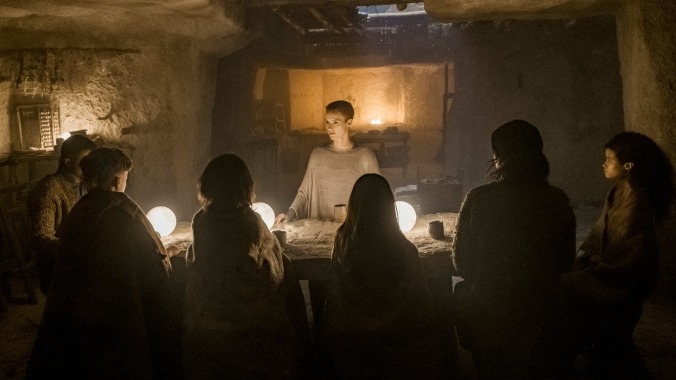Center: Amanda Collin Photo: Coco Van Oppens (HBO Max
In the first few moments of “Virtual Faith,” Mother tells the children—Campion (Winta McGrath), Hunter (Ethan Hazzard), Tempest (Jordan Loughran), Holly (Aasiya Shah), and Vita (Ivy Wong)—an especially creepy version of “The Three Little Pigs,” a story that Campion once loved as a child, which he says he now hates. Campion’s resistance to the story is less about the story itself than the storyteller. Because he no longer trusts the caretaker who raised him, he finds himself pushing back against everything she offers, even speculating that the strange beasts that attacked the camp are just illusions that Mother is using in order to keep the children under her control. In the same way, after seeing Mother’s inconsistent and violent reactions to various forms of conflict, he concludes that she must be responsible for the way that her children keep getting sick. He theorizes that their illness is actually because she is slowly poisoning all of them.
Campion’s skepticism of Mother makes sense, but his new story also flattens his caretaker into a simple one-dimensional villain, when the truth is far more complicated. Alone with Father, Mother expresses fear that it is she who is inadvertently hurting the children. Why else would they all be dying? While Mother had no ethical qualms about destroying the Ark, you can see that she is truly pained by the idea that she could be hurting the children that are under her care. Likewise, Father may be a simple service model, but his self-awareness rivals some of the humans that we’ve encountered in this world. When Campion tells Father he isn’t “real,” he seems just as hurt as Mother when Campion tells her that he never liked her stories.
Joan Didion once famously said that:
We tell ourselves stories in order to live… We look for the sermon in the suicide, for the social or moral lesson in the murder of five. We interpret what we see, select the most workable of the multiple choices. We live entirely, especially if we are writers, by the imposition of a narrative line upon disparate images, by the “ideas” with which we have learned to freeze the shifting phantasmagoria which is our actual experience.
Throughout “Virtual Faith,” we see how human beings use stories not just as a means of understanding the world around them, but also as a way to understand their own identity. When Marcus and Sue discover that their son Paul (Felix Jamieson) is a good artist, he refuses the narrative that he is talented, instead confidently proclaiming the story he was raised with, “I am just the vessel; Sol [the Mithraic god] guides my hand.” Indeed, a large part of Marcus and Sue’s survival is predicated in their willingness to engage with the Mithraic mythology, often having to translate their feelings and ideas using the Mithraic script, whether to avoid a death sentence when Marcus is selected to survey the territory that Mother is destroying or to convince the crew to search for the lost children because, “Sol would not abandon his lost children.”
In contrast, the simulation provides an opportunity for members of the Ark to shift out of their prescribed narratives by exploring different, less restrictive ways of being. The space is meant to be a calm and freeing environment to prepare humans for a lifetime of peace after decades of war. Still, we already know from Tempest’s story that this façade of perfect goodness is merely an illusion. Not only do we have the knowledge that a high-ranking official exploited his position in order to rape a child, but Hunter’s response to the knowledge that Tempest is pregnant is to assert that she was somehow asking for it. For all the performative goodness of the Mithraic, the group is clearly incredibly restrictive, hierarchal, petty, dogmatic, and exclusionary. Not to mention that they execute atheists.
Throughout “Virtual Faith,” we also see how Marcus’ embrace of fatherhood seems like it might also be a way for him to rewrite his own story, rather than simply comfort Paul. After all, the childhood games of “Duck, Duck, Goose” and the tenderhearted gift of a pet mouse do not reflect Marcus’ own experiences of childhood. When we flash back to his upbringing, we see he was a child soldier desperate to survive a dark and violent landscape. He didn’t receive any of the care and tenderness he now emphatically wants to provide Paul.
In this way, Marcus provides a compelling foil for Mother. Both are characters with a dark and war torn past, who are now trying to become caretakers, rather than killers. Is it possible for either of them to rewrite their own stories? We learn that the atheists have never been successful in their quest to reprogram a necromancer like Mother, but we can see that she longs to provide the type of care that her children need, even though she is often failing miserably at it. By the end of the episode, Campion is forced to reassess the story he told himself about Mother’s villainy as Father provides evidence that Mother is not in fact responsible for the children getting sick, and Mother embarks on a mission to save Paul, who Campion now knows he inadvertently put at risk.
Stray observations
- I’m hoping that we’ll look at female identity from outside the lens of motherhood in this series. Right now, the three most developed female characters are all ones grappling with pregnancy or caretaking.
- Would regular ol’ antibiotics help with radiation poisoning?
- While we know that atheists attempted to reprogram the necromancers, we still don’t really know who created the original necromancers, though they do seem like oddly religious figures as they fly across the sky like sleek golden gods, their arms extended in the shape of a cross.

 Keep scrolling for more great stories.
Keep scrolling for more great stories.
